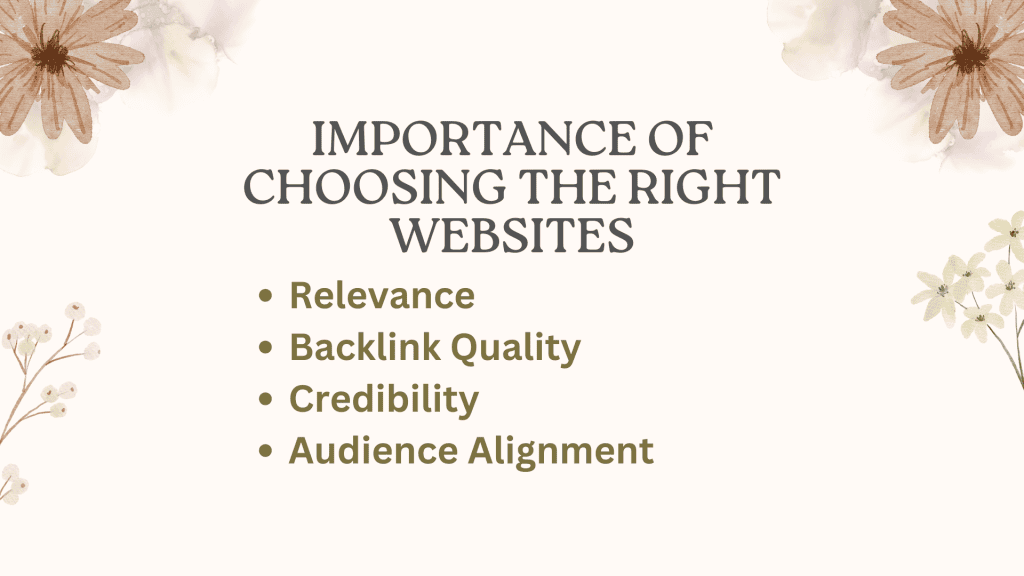Guest posting, also known as guest blogging, is a dynamic and strategic approach within the realm of content marketing. This powerful technique allows you to publish high-quality content on other websites, thus exposing your brand to a wider audience. In this section, we will delve into the significance of guest posting for brand exposure and why it is an indispensable part of any SEO strategy.
Brand exposure is essential for businesses aiming to establish themselves as industry leaders and gain the trust of their target audience. Guest posting offers a unique opportunity to showcase your expertise to a new and diverse set of readers. When your well-crafted guest post is published on authoritative websites, it can significantly enhance your brand’s credibility and visibility.
Guest posting benefits extend beyond brand exposure; it is also a potent link-building strategy. When you contribute valuable content to authoritative websites, you have the chance to earn high-quality backlinks to your own site. These backlinks are crucial for improving your domain authority and enhancing your SEO rankings.
To achieve success with guest posting, it’s crucial to ensure that your contributed content is relevant to both the host website’s audience and your brand’s niche. This alignment strengthens your SEO strategy by connecting your brand with topics that matter to your target audience.
One of the guest posting strategies that cannot be underestimated is the distribution of your content. By strategically choosing where to publish your guest posts, you can increase your online visibility and reach a broader audience. This is especially valuable when collaborating with influencers or industry experts, as it amplifies your content’s reach. Measuring the effectiveness of your guest posting efforts is vital. Track guests post metrics like traffic, engagement, and conversion rates to evaluate the impact of your content. Additionally, guest posting often leads to the acquisition of authority backlinks, which further boosts your domain authority and overall SEO ranking.
In this blog post, our primary objective is to provide you with comprehensive insights into the world of guest posting benefits and strategies. We aim to equip you with the knowledge and tools necessary to harness the potential of guest posting for your brand’s exposure and SEO success.
Understanding Guest Posting
In the ever-evolving digital marketing landscape, guest posting has emerged as a potent strategy, offering a unique avenue for brands to expand their online presence. In this section, we will define guest posting and underscore its significance while distinguishing it from other content marketing strategies. Let’s delve straight into the heart of the matter.
Defining Guest Posting
Guest posting, also known as guest blogging, is a content marketing tactic that involves creating and publishing high-quality articles or blog posts on external websites or blogs. The primary goal of guest posting is to establish the author’s authority, promote their brand, and earn valuable backlinks to their own website.
The Significance of Guest Posting in Digital Marketing
Guest posting holds a paramount position in the digital marketing ecosystem for several compelling reasons:
- Link Building: Guest posting is an effective link-building strategy. By contributing well-crafted content to authoritative websites, you can secure backlinks to your own site. These backlinks enhance your domain authority and improve your website’s SEO ranking.
- Content Marketing: Guest posting is a powerful subset of content marketing. It allows you to share valuable insights and expertise with a broader audience, positioning your brand as an industry leader.
- Influencer Marketing: Collaborating with influencers or authoritative websites through guest posting can significantly amplify your brand’s reach and credibility. It’s an excellent way to tap into their existing audience.
- Backlink Quality: Unlike some link-building strategies that focus solely on quantity, guest posting emphasizes backlink quality. Links from reputable websites carry more weight in search engine algorithms.
- Outreach Strategies: Successful guest posting requires effective outreach strategies. This involves building relationships with editors and webmasters, pitching your ideas, and securing opportunities to contribute.
- Anchor Text Optimization: Within guest posts, you can strategically use anchor text to link back to your website. This optimization enhances the relevance and SEO value of the links.
- Domain Authority: Guest posting on authoritative websites not only builds your backlink profile but also associates your brand with trusted sources, improving your overall domain authority.
- Content Relevance: To succeed in guest posting, your content must be relevant to the host website’s audience and your brand’s niche. This alignment ensures that the content resonates with readers.
- SEO Strategy: Guest posting is an integral part of a well-rounded SEO strategy. It contributes to your website’s overall SEO health by enhancing its link profile and online visibility.
Guest Posting vs. Other Content Marketing Strategies
While guest posting shares common goals with other content marketing strategies, such as blogging and content creation, it distinguishes itself in the following ways:
- Backlink Focus: Guest posting places a strong emphasis on acquiring backlinks from external sources, which can significantly impact SEO.
- Third-Party Platforms: Unlike on-site content creation, guest posting leverages third-party platforms to reach a wider audience and gain credibility.
- Authority Building: Guest posting is particularly effective at building personal and brand authority by associating with established websites.
- Targeted Outreach: Guest posting involves targeted outreach efforts to secure publishing opportunities on relevant and high-authority websites.
Benefits of Guest Posting
Guest posting has emerged as a powerhouse strategy in the digital marketing landscape, offering a plethora of advantages for brands and businesses seeking to enhance their online presence.
1. Boosts SEO through Quality Backlinks
One of the most compelling benefits of guest posting is its ability to bolster your website’s SEO. When you contribute valuable content to authoritative websites, you earn high-quality backlinks. According to a study by Moz, backlinks remain one of the top-ranking factors in Google’s algorithm. Guest posting provides a strategic avenue for acquiring these valuable links, thereby improving your website’s search engine ranking.
2. Establishes Authority and Credibility
Guest posting allows you to position yourself or your brand as an industry authority. When you share valuable insights and expertise with a broader audience, you build credibility. In fact, a survey by Nielsen revealed that consumers are more likely to trust content from experts in the field. Guest posting enables you to showcase your knowledge and expertise, strengthening trust among your target audience.
3. Expands Brand Visibility
Brand exposure is integral to success in the digital realm, and guest posting plays a pivotal role in expanding your brand’s reach. By collaborating with influencers or authoritative websites, you tap into their existing audience, instantly increasing your brand’s visibility. This strategic partnership can lead to exponential growth in your online presence.
4. Drives Targeted Traffic
Guest posting drives targeted traffic to your website. When your content is published on relevant platforms, you attract an audience genuinely interested in your niche. This targeted traffic is more likely to engage with your content and convert into customers. According to HubSpot, businesses that prioritize blogging are 13 times more likely to achieve a positive ROI.
5. Enhances Content Distribution
Effective content distribution is crucial in today’s competitive digital landscape. Guest posting not only broadens your content’s reach but also diversifies your distribution channels. This multifaceted approach increases your content’s chances of going viral and reaching a wider audience.
6. Improves Domain Authority
Domain authority is a key indicator of a website’s trustworthiness and relevance. Guest posting on authoritative websites not only secures valuable backlinks but also associates your brand with trusted sources. Over time, this contributes to an increase in your domain authority, strengthening your overall online presence.
7. Fosters Networking and Relationships
Successful guest posting requires effective outreach and relationship building. As you connect with editors and webmasters, you create valuable industry connections. These relationships can lead to additional guest post opportunities and collaborations, further amplifying your brand’s visibility.
Identifying Target Websites
Choosing the right websites for guest posting is a critical step in maximizing the benefits of your guest posting strategy. In this section, we’ll delve into the importance of selecting the right websites and provide valuable tips and strategies for identifying high-quality websites within your niche.

Importance of Choosing the Right Websites
The websites you select for guest posting can significantly impact the success of your guest posting efforts and overall SEO strategy. Here’s why it’s crucial:
- Relevance: Posting on websites closely related to your niche ensures that your content is relevant to the target audience. This relevance helps in engaging readers and driving traffic to your site.
- Backlink Quality: High-quality websites often have strong domain authority and backlink profiles. Guest posting on such websites can earn you valuable backlinks, improving your website’s SEO ranking.
- Credibility: Associating your brand with reputable websites enhances your brand’s credibility and authority in the eyes of both search engines and readers.
- Audience Alignment: Websites within your niche likely have an audience interested in your industry. Guest posting allows you to tap into this pre-existing, relevant audience.
Tips for Identifying High-Quality Websites
- Assess Domain Authority (DA): Use tools like Moz’s Domain Authority to evaluate the authority of potential websites. Aim for websites with a DA of 40 or higher for better backlink quality.
- Analyze Content Relevance: Ensure that the website’s content aligns with your niche and the topics you want to cover. Relevant content is more likely to resonate with readers.
- Check Backlink Profile: Examine the website’s backlink profile to ensure it doesn’t have a history of spammy or low-quality backlinks. A healthy backlink profile indicates trustworthiness.
- Evaluate Engagement Metrics: Look at metrics like organic traffic, social media engagement, and comments to gauge the website’s level of audience engagement. A website with an active and engaged audience is ideal.
- Review Guest Post Guidelines: Many websites have guest post guidelines outlining their requirements. Review these guidelines to ensure your content aligns with their expectations.
- Examine Guest Post Examples: Analyze existing guest posts on the website to get an idea of the quality and style they expect. This can help you tailor your content accordingly.
Strategies for Identifying Target Websites
- Keyword Research: Use relevant keywords in your niche to identify websites that frequently publish content related to your industry. Tools like SEMrush or Ahrefs can aid in keyword research.
- Competitor Analysis: Analyze where your competitors are guest posting. These websites may also be suitable targets for your guest posting efforts.
- Industry Directories: Explore industry-specific directories or lists of top websites within your niche. These directories often feature high-quality websites open to guest contributors.
- Influencer Recommendations: Reach out to industry influencers or experts for website recommendations. They may suggest authoritative websites they’ve worked with in the past.
- Guest Post Marketplaces: Some platforms and marketplaces connect guest bloggers with website owners looking for content. These platforms can streamline the guest posting process.
Crafting High-Quality Content
Creating a successful guest post that not only meets the host website’s guidelines but also engages and provides value to the readers is a crucial component of effective guest posting. In this section, we will break down the essential elements of a successful guest post and offer valuable guidance for crafting engaging and valuable content.
Essential Elements of a Successful Guest Post
- Relevance: Ensure that your guest post is highly relevant to both the host website’s audience and your niche. Align the topic with the interests and needs of the readers.
- Value Proposition: Provide a clear and compelling value proposition in your guest post. Let readers know what they will gain from reading your content, whether it’s knowledge, solutions to problems, or insights.
- Engaging Headline: Craft an attention-grabbing headline that piques the readers’ curiosity and accurately reflects the content’s main idea. Use powerful words and make it clear what the post is about.
- Well-Structured Content: Organize your content into clear sections with headings and subheadings. Use short paragraphs and bullet points to make it easy for readers to scan and digest the information.
- In-Depth Information: Dive deep into the topic, providing comprehensive and valuable insights. Back up your claims with data, examples, and expert opinions whenever possible.
- Clarity and Simplicity: Write in a clear and straightforward manner. Avoid jargon and complex language that might confuse readers. Use simple and concise sentences.
- Engaging Tone: Adopt a conversational and engaging tone in your writing. Connect with readers on a personal level and make them feel like you’re speaking directly to them.
- Visual Elements: Incorporate visuals like images, infographics, and charts to enhance the content’s visual appeal and aid in understanding complex concepts.
- Internal and External Links: Include relevant internal links to the host website’s content, demonstrating your familiarity with their content. Also, add high-quality external links to authoritative sources to support your claims.
Guidance on Creating Engaging and Valuable Content
- Audience Understanding: Prioritize understanding the host website’s audience. Tailor your content to address their pain points, interests, and questions.
- Unique Perspective: Offer a unique perspective or fresh insights on the chosen topic. Avoid regurgitating commonly known information.
- Storytelling: Incorporate storytelling elements when appropriate. Stories can captivate readers and make the content more relatable.
- Actionable Advice: Provide actionable advice or actionable takeaways that readers can apply immediately to solve their problems or improve their situation.
- Visual Appeal: Invest in the visual appeal of your content. Use high-quality images, graphics, and formatting to make it visually appealing.
Adhering to the Host Website’s Guidelines
- Review Guidelines Thoroughly: Carefully read and understand the host website’s guest posting guidelines. Pay attention to formatting, word count, and any specific requirements they may have.
- Conform to Tone and Style: Match the tone and style of the host website’s content. This helps your guest post seamlessly integrate with their existing content.
- Respect Word Limits: Stick to the prescribed word limit, neither exceeding it nor falling significantly short. This demonstrates your ability to follow instructions.
- Quality Assurance: Thoroughly proofread and edit your content to ensure it’s free from grammatical errors, typos, and formatting issues. High-quality writing reflects positively on your credibility.
Conclusion
- Guest Posting is a Valuable Strategy: Guest posting is not just a means to build backlinks; it’s a powerful content marketing strategy that can significantly enhance brand exposure and authority.
- Quality Matters: Focus on quality over quantity when selecting websites for guest posting. High-quality backlinks from authoritative websites can positively impact your SEO strategy.
- Relevance is Key: Ensure that your guest post is highly relevant to both the host website’s audience and your niche. This alignment enhances the value you provide to readers.
- Engaging Content Wins: Crafting engaging and valuable content is paramount. Use clear, concise language, and offer actionable advice to keep readers engaged and satisfied.
- Adhere to Guidelines: Always adhere to the host website’s guidelines. This demonstrates professionalism and increases the chances of your guest post being accepted.
- Build Relationships: Building relationships with website owners and editors can lead to more guest post opportunities and collaborations in the future.
Guest posting is a strategic cornerstone in the world of digital marketing, offering brands and businesses a direct path to enhanced brand exposure. By collaborating with authoritative websites and creating valuable, reader-centric content, you can elevate your brand’s visibility and credibility within your niche. It’s a symbiotic relationship that benefits both you and the host website’s audience, creating a win-win scenario.
Now that you’ve gained insights into the benefits and strategies of guest posting, it’s time to take action. Implement the strategies discussed in this blog post to identify high-quality websites, create compelling guest posts, and enhance your brand’s exposure. Don’t wait; start your guest posting journey today and unlock the immense potential it holds for your brand’s online visibility and authority.
FAQs
What are the benefits of guest posting for SEO?
Guest posting offers several SEO benefits, including quality backlinks, improved domain authority, increased online visibility, and enhanced brand authority. When you contribute valuable content to authoritative websites in your niche, you earn high-quality backlinks that boost your site’s ranking in search engine results pages (SERPs). Additionally, guest posting helps you establish your brand as an industry authority, attracting more organic traffic and potential customers to your site. It’s an effective strategy for improving your overall SEO performance.
How can I find guest post opportunities?
To find guest post opportunities, start by conducting thorough research within your niche. Look for authoritative websites, blogs, or publications that accept guest contributions. Use search engines, social media, and specialized tools to identify potential targets. Additionally, leverage industry directories, guest post marketplaces, and networking with influencers to discover opportunities. Always review guest post guidelines and reach out to website owners or editors with a well-crafted pitch showcasing your expertise and the value you can provide to their audience.
What are the best practices for guest posting outreach?
Guest post outreach requires a personalized approach. Begin by researching the target website’s content and audience to ensure alignment with your expertise and content. Craft a concise and compelling pitch that highlights your unique perspective and the value you can offer to their readers. Follow the website’s submission guidelines meticulously, and be respectful of their time. Additionally, build relationships with website owners and editors through social media or networking events to increase your outreach success rate.
How do I measure the ROI of guest blogging?
Measuring the ROI of guest blogging involves tracking key metrics such as website traffic, backlinks acquired, lead generation, and conversions. Use web analytics tools like Google Analytics to monitor changes in organic traffic and user behavior after guest posting. Assess the quality and quantity of backlinks earned and their impact on your site’s SEO performance. Moreover, set up tracking mechanisms to monitor lead generation and conversion rates from guest post referrals. By analyzing these metrics over time, you can gauge the ROI of your guest blogging efforts.
Is guest posting better than traditional blogging?
Guest posting and traditional blogging serve different purposes. Guest posting allows you to tap into existing audiences on authoritative websites, earning quality backlinks and enhancing your brand’s authority. Traditional blogging on your own site is essential for building and nurturing your own audience, showcasing your expertise, and maintaining control over your content. Both strategies complement each other in a well-rounded content marketing approach. Rather than choosing one over the other, consider integrating both guest posting and traditional blogging into your content strategy to maximize their respective benefits.
How can I maximize the exposure of my guest posts?
Maximizing the exposure of your guest posts involves promotion and distribution. After publication, share your guest post on your social media channels, email newsletter, and other owned media platforms to reach your existing audience. Engage with the host website’s audience through comments and responses. Collaborate with the host website on additional promotional efforts, such as newsletters or social media shares. Furthermore, consider repurposing the content into different formats, such as videos or infographics, to reach a wider audience. Building relationships with influencers in your niche can also help amplify the exposure of your guest posts through their networks.
What are the guidelines for writing a guest post?
Writing a successful guest post requires adhering to guidelines set by the host website. Start by carefully reading and understanding their guest post guidelines. Follow the prescribed formatting, word count, and style requirements. Ensure that your content is highly relevant to both the host website’s audience and your niche. Craft an engaging headline, use clear and concise language, and offer actionable advice or valuable insights. Incorporate visuals, internal and external links, and follow best practices for SEO. Thoroughly proofread and edit your content to eliminate errors and maintain professionalism.
How can I build high-quality backlinks through guest posting?
To build high-quality backlinks through guest posting, focus on the following strategies:
- Choose authoritative websites: Target websites with high domain authority and relevance to your niche.
- Create valuable content: Craft informative and engaging content that naturally attracts backlinks.
- Use contextual links: Incorporate relevant internal and external links within your guest post.
- Diversify anchor text: Use a variety of anchor text to maintain a natural link profile.
- Promote your guest posts: Share your guest posts on social media and with your network to increase their visibility and backlink potential.
Can small businesses benefit from guest posting?
Yes, small businesses can benefit significantly from guest posting. Guest posting provides a cost-effective way to enhance brand exposure, build backlinks, and establish industry authority. By contributing valuable content to authoritative websites, small businesses can reach a broader audience, drive targeted traffic, and improve their online visibility. It also helps in building relationships with influencers and other businesses in the niche. Guest posting is a versatile strategy that can be tailored to suit the specific goals and needs of small businesses, making it a valuable addition to their digital marketing efforts.
How do I approach influencers for guest post collaborations?
Approaching influencers for guest post collaborations requires a thoughtful and strategic approach. Start by researching and identifying influencers in your niche whose audience aligns with your target audience. Follow them on social media, engage with their content, and build a genuine relationship by providing value and support. Reach out to them with a personalized and well-crafted pitch, highlighting the mutual benefits of collaboration. Emphasize how your guest post can provide value to their audience. Be respectful of their time and preferences, and be open to negotiation and collaboration opportunities that align with both parties’ goals. Building a strong rapport with influencers can lead to fruitful guest post collaborations and expanded brand exposure.






